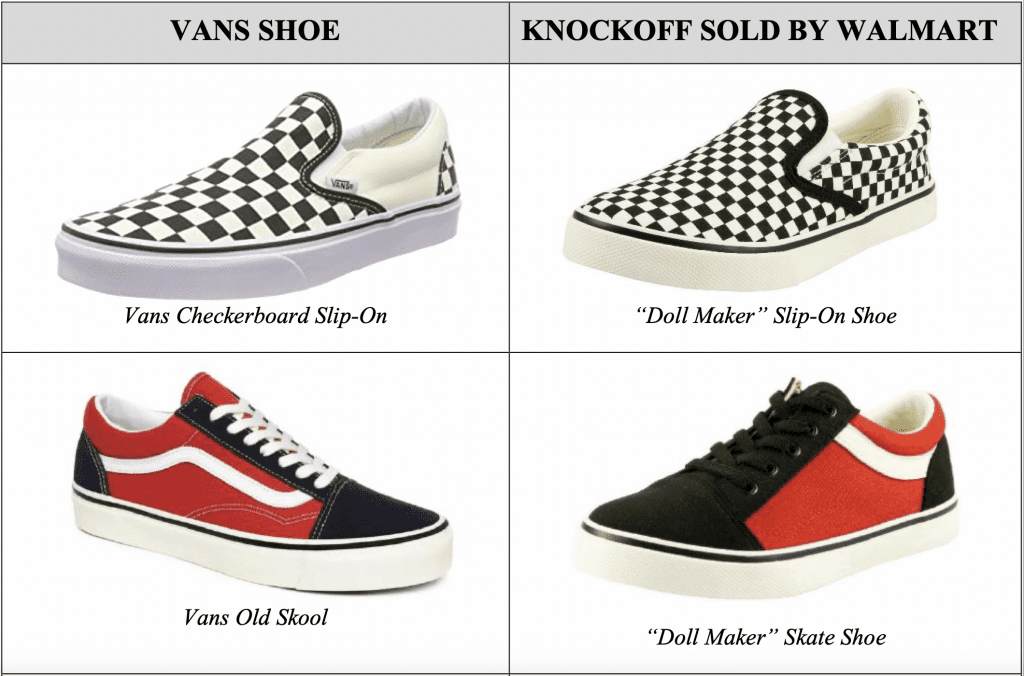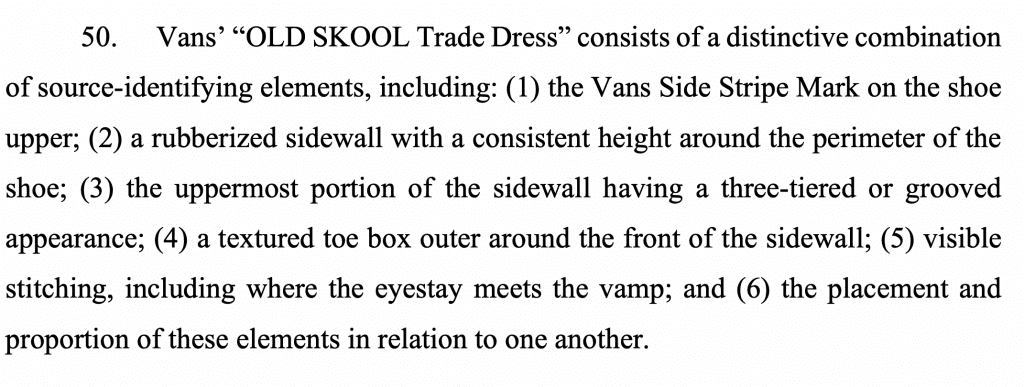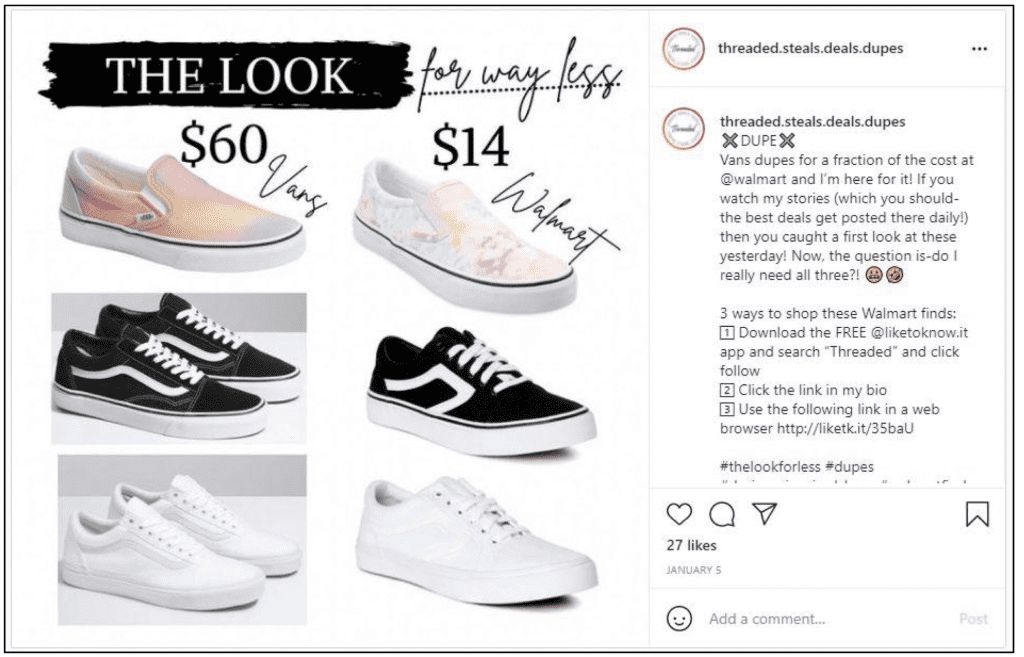Vans is accusing Walmart of embarking on “an escalating campaign to knock off virtually all of [its] bestselling shoes” and running afoul of its trademark rights in the process in the latest legal battle over footwear. In the complaint that they filed in a California federal court on Monday, Vans and its parent company VF Corp. assert that in light of the fact that Walmart is not an authorized retailer of Vans and thanks to the “tremendous value” tied to its many well-known trademarks, Walmart “started shamelessly selling copycat shoes in a direct effort to confuse consumers, unlawfully siphon sales from Vans, and intentionally damage its valuable intellectual property rights.”
According to the newly-filed, 100-plus page complaint, Vans claims that in a brazen attempt to bank on the multi-decade-long appeal of its brand and famous offerings, Walmart – through its own in-house labels, “Time and Tru,” “Wonder Nation,” and “No Boundaries” –has “flooded the market with cheap, low-quality, and confusingly similar shoes” that are little more than “blatant knockoff versions of Vans shoes. Because Walmart’s lookalike offerings are “likely to cause confusion, deception, and mistake by creating the false and misleading impression that the defendants’ goods are produced or distributed by Vans, or are affiliated, connected, or associated with Vans, or have the sponsorship, endorsement, or approval of Vans,” Vans asserts that Walmart is “willfully infringing [its] trademark and trade dress rights.”

As for what those trademark and trade dress rights consist of, Vans points primarily to its “jazz stripe,” which it says adorns the side panel of many of its shoes and has since at least as early as the 1970s. Serving “no function other than as a signifier of the Vans brand,” Vans asserts that it has sold hundreds of millions of shoes bearing the “now-iconic” stripe in the U.S., alone, and has generated “tens of billions of dollars” in revenue as a result. (At the heart of the “jazz stripe” marks, as indicated by the consistent and near-uniform use, and by its registrations, is not merely the stripe, itself, but the placement of the stripe, which suggests to me that this might not be an open-and-shut argument when it comes to similarity and/or likelihood of confusion.)
“Also central to this lawsuit is the OLD SKOOL shoe,” the brand states, referring to the “iconic low-top skate shoe” that is one of its “bestselling shoes of all time.” The design elements of the shoe (as set out below) exclusively serve as an indicator of the source of the shoes, per Vans, and they do so in a way that does not deprive competitors of design elements, as fellow footwear-makers “have available a multitude of alternative shoe designs they could use.”
In addition to the stripe logo and the OLD SKOOL shoe trade dress, Vans cites a handful of other “distinctive” footwear designs, including its Checkerboard Slip-On, which it says that it has used consistently – and “methodically” built up trademark rights in (and received registrations for) – “for nearly half a century,” making it so that the designs “drive much of the company’s popularity and success.”

With that in mind, Vans claims that Walmart has been offering up “calculated and intentional knockoffs” of its footwear products, and actually increased the output of such alleged infringement after counsel for Vans alerted the Bentonville, Arkansas-based retail behemoth of the infringing nature of its sneakers. On the heels of first introducing its “Time and Tru” women’s shoes by way of its in-house labels, Vans claims that over the course of a few months, Walmart “gradually introduced over twenty additional knockoffs in a concerted, systematic, and escalating campaign to rip off Vans’ shoes in broad-brush fashion,” making it so that “the scope of Walmart’s infringement cannot be overstated.”
What may be even more interesting than Vans’ allegations about the infringing footwear, itself, are its claims that Walmart goes further to confuse consumers by taking “additional, affirmative steps to try to associate itself and its infringing shoes with Vans.” For instance, Vans argues that Walmart “intentionally markets all of its infringing shoes as either ‘Skate’ or ‘Retro’ sneakers in an attempt to suggest a connection with Vans’ products.” At the same time, Vans points to Walmart’s sale of the allegedly infringing footwear alongside what appears to be authentic Vans sneakers, the latter of which are offered up by sellers on Walmart’s third-party marketplace.
“Walmart’s deceptive marketing tactics do not stop there,” though, per Vans, as “Walmart also enlists endorsers and influencers to promote its products, including its subject infringing shoes, via other websites or social media platforms … through its ‘Walmart.com Affiliates Program.’” The issue here, according to Vans, is that Walmart is “well aware that many of its affiliates promote and endorse [the] infringing footwear by (1) openly referring to Vans while promoting them, (2) explicitly selling them as ‘Van dupes‘ or ‘knockoffs,’ and/or (3) intentionally trying to divert potential customers away from Vans by suggesting that the prestige of Vans’ shoes can be acquired without paying [its] normal prices.”

With the foregoing in mind, Vans claims that Walmart’s copycat footwear is causing actual confusion among consumers, and unless stopped, “Walmart’s infringing footwear will continue to cause confusion in the marketplace, including but not limited to initial interest confusion, confusion at the point of purchase, post-sale confusion, and confusion in the secondary market.” As such, Vans sets out claims of direct and contributory trademark infringement, unfair competition, and false designation of origin under the Lanham Act and California state law, and is seeking injunctive relief and monetary damages.
For some larger context, the case (and Walmart’s alleged infringement spree) comes as the retail titan, which has solidly held the title of the largest retailer in the world for decades, is looking to bolster its offerings – and its e-commerce presence – in an attempt to compete with rival Amazon and also to stay in stride with digitally-connected consumers. This quest has seen Walmart endeavoring to amass a larger piece of the mainstream apparel and accessories market, including by way of M&A activity and private labels, such as the ones at issue in this case, as well as ones that has been launching with the help of famous faces. “We are in the process of building these brands that have their own DNA,” Denise Incandela, Walmart’s EVP, Apparel Division and Private Brands, said back in 2019 about the retailer’s increased activity on the private label front. “We are keen on building out great quality products at an exceptional value.”
Beyond that, Walmart has also doubled-down on its third-party marketplace, which grew to an estimated 70,000 sellers in 2020, per Reuters, “fueled by a surge in online shopping due to the Covid-19 pandemic and a series of investments in technology and vendor relationships.” Data firm Marketplace Pulse reported earlier this year that it expects growth in the number of sellers on Walmart’s marketplace to surge by 146 percent by the end of 2022.
The case is Vans, Inc. et al, v. Walmart, Inc., et al, 8:21-cv-01876 (C.D.Cal.)











